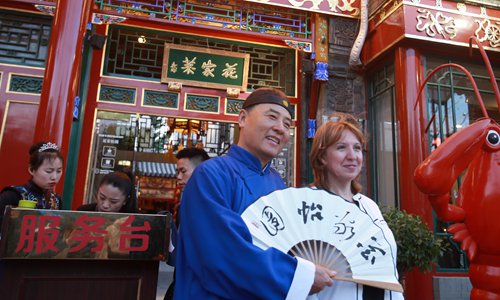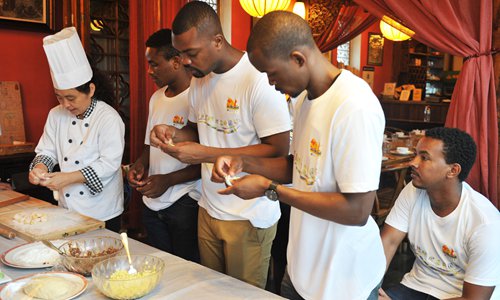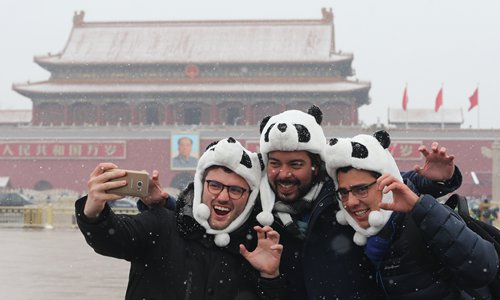METRO BEIJING / METRO BEIJING
China changed me
Expats tell their personal stories on how living in the East has given them a richer life

A foreigner takes a photo with a restaurant employee in clothes depicting the old Beijing style of dress. Photo: IC
As soon as Violet Woolwine (pseudonym) felt the plane's landing gear hit the tarmac in Beijing, her heart skipped a beat. Her legs shook with each step down the stairs leading to the shuttle bus waiting below. "What have I done?" she thought. Woolwine, a 31-year-old white-collar worker from the US who has been working in Beijing for two years, says that she would not even recognize the girl who stepped off the plane if she saw her today.
"I feel like a new person," she said. "Living here has made my life more well-rounded and helped me grow personally and successfully, and has set me up for great things in the future."
Living in China has its own elements that cause a change in expats, such as learning to deal with large crowds and having to learn the ways of a new culture. Some reject these changes and cultural differences, while others embrace them.
The Metropolitan spoke with expats who have experienced personal growth during their time in China about how they think these changes will help them throughout the rest of their lives.
First impressions
When Mio Rudnicki, 25, an American who has lived in China, the US and Japan, landed in China for the first time many years ago, her first thoughts were, "Let's do this!" However, when she moved back to China in May after completing school, things were not how she remembered.
"Moving to Beijing was totally different. Neither my husband nor I had the comfort of old friends we grew up or went to college with," she said.
But five months later, Rudnicki and her husband now have good friends and great jobs, and their Chinese is improving.
"This has shown me that I can make any new situation work as best I can," she said.
Jovana Bogojevic, a 22-year-old student from The Republic of Montenegro, said she had similar sentiments when first arriving in China.
"Stepping out of the airplane and experiencing Wuhan's extremely humid weather, my first thought was 'aircon!' Jokes aside, I felt like I was taking the first step into my future," she said.
When Bogojevic arrived in China, she had just turned 18 and was ready for her first big life change. For her, coming to China was quite an adventurous path.
"Now, when I am insecure about a certain career choice or a risky move, I look back at that moment and just follow my instincts, no matter what," she said.
For Cynthia Santana, 41, who has worked as an educator in Beijing for many years, the first moments were a little shaky, but she stood her ground.
"I thought to myself, 'Wow! I'm here, too far to turn back,'" she said. Before she came to China, she suffered from anxiety, post-traumatic stress disorder and sometimes depression.
"But when you are on your own in another land, you don't have time to waste on those emotions, you're too busy trying to survive and make your way through this world," she said.
While moving abroad can cause anyone to gain a broader perspective and change aspects of their personality, there are changes that some expats feel are specific to China.

Students from African countries learn to make dumplings in Beijing. Photo: IC
China-specific changes
Most expats agree that there are cultural differences in China that are hard to get used to, but for Rudnicki, the differences in public transportation proved extremely challenging.
"I've had to actively work to control my outbursts of rage while walking, biking and taking the metro around the city; I definitely don't manage to control them all the time," she said. However, she has found a way to ease her frustration by learning more about the county through reading.
"It's insanely impressive how quickly China has grown to be where it is today compared to where it was only 30 years ago," she said, adding that China has come such a long way in a much, much shorter period than any other country she can think of. "I need to be more understanding."
For Woolwine, China is her first experience abroad other than a visit to Canada when she was 17. China took her out of her comfort zone, and while this is true of many expats moving to another country, she feels China has given her a platform for personal change.
"I feel China has allowed me to become a better version of myself. I have a deep respect for the culture and the people," she said.
Back home Woolwine was used to being around friends all the time and never really spent a moment alone.
"It is weird how in China you are around millions of people every day, but you can still feel alone," she said, adding that it is not a bad thing.
"I have learned to find solace in being alone, which is something I never felt back home in the US. I feel more in control of my life and that I have the ability to be who I want to be since the culture and people here are so diverse, and change is an everyday part of life."
Woolwine believes that as China develops, changes and grows every day, she does the same.
"I don't think this is something you will see in many other countries, and it has made me realize that change is good and that I am constantly evolving and that's okay," she said.
For Bogojevic, it is as simple as developing new habits.
"One of the simplest examples of significant changes specific to a Chinese lifestyle would be the culture of drinking hot water. I feel it'd be impossible now to leave the house without a small bottle of hot water," she said.
Santana's change came from an incident that occurred when she first came to China.
"Yes, I learned resiliency! The very definition states 'able to recover readily, as from misfortune,' and I had several misfortunes upon arriving in China," she said.
One of the biggest misfortunes she suffered was falling and succumbing to serious injury in her first month in China, which resulted in her only having the use of one arm for four months. "It definitely toughened me up," she said.

Three foreigners wearing panda hats take a selfie in Tiananmen Square. Photo: IC
The future
A new environment and the specifics of the Chinese culture have had a lasting effect on many expats who will carry them into the future, whether in China or after their stay here has ended.
Rudnicki believes she has grown enormously as a person.
"I believe I have become a better, more self-aware person. I have grown as an individual and as a part of society as a whole, and I think that can only help me in the future. These changes are lessons I can take with me with every new move, interaction and situation where I don't feel in control," she said.
Woolwine thinks that her personality has undergone a great change, and she has China to thank.
"Being in a culture and place so opposite from where I lived my entire life has really taught me how closed-minded I used to be and broken the stereotypes I held about China before arriving," she said.
She added that she knows that living in China will be a gateway to a successful future. "Living and working here has taught me how to deal with a culture vastly different from any I have experienced. I have also learned how to be more motivated and self-reliant. Because of China, I feel less dependent on others, and I know that I can do anything if I put my mind to it."
Bogojevic says that when she returns home, friends and family can see the change in her.
"I go once or twice a year, and I think they mostly noticed the changes in my view of the world, mindfulness, easygoingness, patience and so on. They welcome such changes. Sometimes they even incorporate them into their own lifestyle," she explained.
According to a study led by William Maddux, an associate professor of organizational behavior at the University of North Carolina at Chapel Hill in the US, people who have international experience or identify with more than one nationality are better problem solvers and display more creativity.
"What's more, we found that people with this international experience are more likely to create new businesses and products and to be promoted," Maddox wrote in his findings.
Angela Leung, an associate professor of psychology at Singapore Management University who also studied the psychological effects of living abroad, said that people who experience different cultures are better able to generate creative ideas and make unexpected links among concepts.
"The serendipitous creative benefits resulting from multicultural experiences may depend on the extent to which individuals open themselves to foreign cultures," she explained.
Findings suggest that those who choose to integrate into the country they are in find a more enriching and growth-oriented experience.
"Moving to China is by far one of the best decisions I have ever made," said Woolwine.
"I can't wait to see how much more I can grow. I truly believe my experiences in China have changed me into a more well-rounded person, and I can't wait to see what the future holds."
